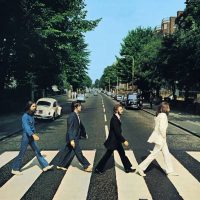You Dont Give Me Your Money All You Give Me Is Funny Faces
 Written by: Lennon-McCartney
Written by: Lennon-McCartney
Recorded: 6 May; 1, 11, 15, 30, 31 July; 5 August 1969
Producer: George Martin
Engineers: Glyn Johns, Phil McDonald, Geoff Emerick
Released: 26 September 1969 (UK), 1 October 1969 (US)
Available on:
Abbey Road
Personnel
Paul McCartney: vocals, backing vocals, bass, piano, guitar, tubular bells, tape loops
John Lennon: backing vocals, guitar
George Harrison: backing vocals, guitar
Ringo Starr: drums, tambourine
A lament about The Beatles' business wranglings of early 1969, 'You Never Give Me Your Money' was written by Paul McCartney and was the genesis of the 'long medley' that dominated the second half of the Abbey Road album.
This was me directly lambasting Allen Klein's attitude to us: no money, just funny paper, all promises and it never works out. It's basically a song about no faith in the person, that found its way into the medley on Abbey Road. John saw the humour in it.
Paul McCartney
Many Years From Now, Barry Miles
The song is made up of a number of disparate parts, joined together in the manner of John Lennon's 'Happiness Is A Warm Gun'. In McCartney's 1969 notebook three separate titles were listed: 'You Never Give Me Your Money'; 'Out Of College'; and 'One Sweet Dream'.
The first part was written in New York City in late March or early April 1969. It begins with a thinly-veiled protest at the influence of Allen Klein, whom McCartney profoundly distrusted.
'Funny paper' – that's what we get. We get bits of paper saying how much is earned and what this is and that is, but we never actually get it in pounds, shilling and pence. We've all got a big house and a car and an office, but to actually get the money we've earned seems impossible.
The second part – "Out of college, money spent…" – is a fondly nostalgic look back to The Beatles' earliest days, with a boogie-woogie backing led by McCartney on piano. Wistfully recalling the days when the group yearned to be "toppermost of the poppermost", having left college with no money and few job prospects, it describes "that magic feeling: nowhere to go."
In his notebook containing the original lyrics, McCartney wrote "knowwhere to go" with the k crossed out, indicating that he was considering the phrase "know where to go" instead.
The Beatles' future may be gone, but McCartney is determined to salvage their spirit, and that of the Sixties, for his future. 'You Never Give Me Your Money' marks the psychological opening of his solo career.
Revolution In The Head, Ian MacDonald
A lengthy guitar solo acts as a bridge to the penultimate part of the song ("One sweet dream, pick up the bags and get in the limousine"). This section was written while McCartney was in New York with his wife Linda, and referred to their fondness for getting purposefully lost in the countryside.
The climax of 'You Never Give Me Your Money' is the repeated chant: "One two three four five six seven, all good children go to heaven". It is backed by a motif of guitar notes that would later return as the bridge between 'Carry That Weight' and 'The End'.
The song plays out with a selection of tape loops, with which the song segues into 'Sun King'.
That's Paul. Well, that's not a song, you know. Abbey Road was really unfinished songs all stuck together. Everybody praises the album so much, but none of the songs had anything to do with each other, no thread at all, only the fact that we stuck them together.
John Lennon
All We Are Saying, David Sheff
In the studio
The Beatles began recording 'You Never Give Me Your Money' on 6 May 1969. They laid down 36 takes of the song, which at this point ended abruptly immediately before the "One two three four five six seven" refrain.
Paul McCartney's guide vocals were recorded on track one of the eight-track tape; his piano was on track two; Ringo Starr's drums on three; John Lennon's guitar on five; and George Harrison's guitar on six. Lennon's rhythm guitar is first heard as the "Out of college" section begins.
McCartney alone returned to it on 1 July, overdubbing his lead vocals onto take 30. It was left again until 11 July, when he added a bass guitar part, which was recorded onto track seven of the tape.
Four days later, on 15 July, he added more vocals to track five, joined by Starr on tambourine. McCartney also overdubbed tubular bells onto track eight, and manually double-tracked his second-verse lead vocals on track one.
Six rough stereo mixes were also made on 15 July, only three of which were complete. None were used on the album, and the song received further overdubs at a later date.
On 30 July six reduction mixes of the song were made. These were numbered 37-42, and take 40 was considered the best. Additional vocals and tambourine were added to it, although the mix and overdubs were later discarded.
On that date The Beatles also prepared a rough mix of the long medley. They tried various ways to merge 'You Never Give Me Your Money' into 'Sun King', and at this point settled upon a long organ note.
McCartney completed the song the next day with the addition of bass guitar and honky-tonk piano. These were added onto take 30 of the original eight-track tape.
The crossfade into 'Sun King', meanwhile, was finally settled on 5 August, when he assembled a collection of tape loops containing the sounds of bells, birds, bubbles and insects.
birminghamstruity.blogspot.com
Source: https://www.beatlesbible.com/songs/you-never-give-me-your-money/
0 Response to "You Dont Give Me Your Money All You Give Me Is Funny Faces"
Post a Comment